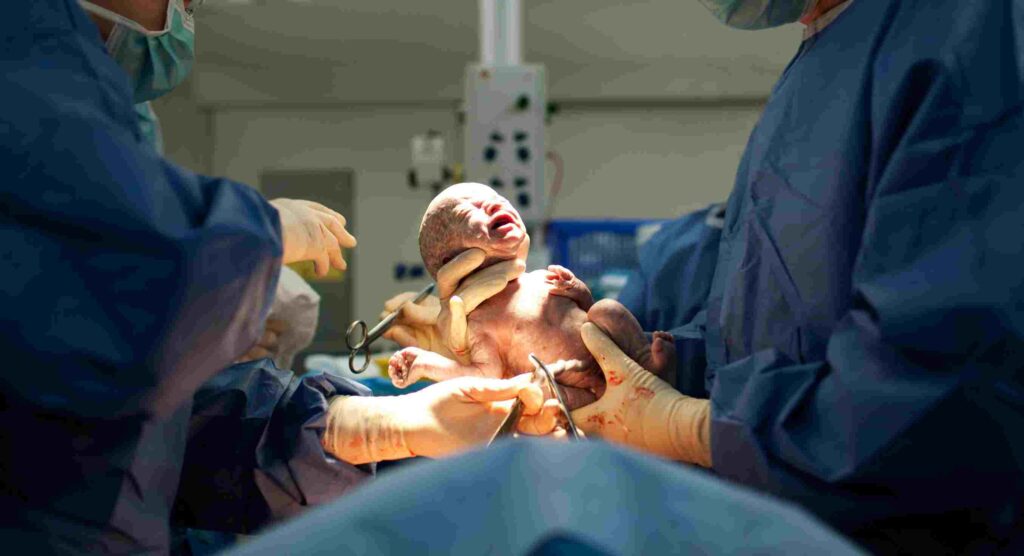The best hospital for normal delivery in Gurgaon
The best hospital for normal delivery in Gurgaon
The best hospital for normal delivery in Gurgaon Every couple feels excited to bring a new life into the world. Pregnancy is that crucial phase wherein you have enough time to prepare for childbirth. Silver Crest Hospital offers comprehensive medical care to ensure couples have a stress-free journey to parenthood. It is the best hospital for normal delivery in Gurgaon district, Haryana. We have a dedicated staff of obstetricians, gynecologists, and neonatologists to help deliver healthy babies. Register here for services like childbirth, pregnancy monitoring, and postnatal care.

Stages of normal delivery
Pregnancy is a 9-month natural process that ends with childbirth. The delivery can be spontaneous, induced, caesarian, or instrumental. Here, we will talk about normal delivery, the most preferred way to deliver a baby. Normal delivery is safe for the mother and child because childbirth via the vagina is less infectious. It starts with labor pain and completes when the uterus contracts after removing everything inside. Here is a brief discussion of its typical three stages.
Stage 1: Dilation
The first phase of vaginal delivery involves contractions and cervical dilation. The cervix (mouth of the uterus) must dilate about 10 centimeters to allow your baby to pass through. Initially, the mother feels mild, short, and irregular contraction pain. The early labor stage lasts up to 20 hours and causes the cervix to widen to about 3 centimeters.
As labor progresses to the next stage, contractions become more powerful and may occur every 2-3 minutes. During this active phase, the cervix dilates more rapidly and widens for about 8 centimeters. As labor progresses to the transitional stage, the cervix will open to the fullest, enabling the baby to exit the birth canal.
Stage 2: Delivery
Upon full dilation of the cervix, you may have regular contractions and an intense urge to bear down. Your obstetrician will ask you to push hard to enable the baby to find the way out. With every push and contraction, your baby moves through the birth canal. Soon, the top of the baby’s head emerges at the vaginal opening.
Once the doctor notices the crowning, they will administer episiotomy and prepare for the delivery. During childbirth, the head first comes out, then the shoulders, followed by the rest of the body. The doctor will clear the airway to help the baby take their first breath. Eventually, they will clamp and cut the umbilical cord.
Stage 3: Afterbirth
Placenta delivery is the next stage after childbirth. Removing the entire placenta is vital for the well-being of the mother. This placenta-removal process takes 5 to 30 minutes after the baby exits via the birth canal. You may feel uterine contractions again during this phase, but the pain is tolerable. To promote contractions and lessen bleeding, your doctor may give you medicines before and after the placenta comes out.
When the placenta is ready to be removed, the doctor will ask you to push downwards. They may gently pull on the umbilical cord and massage the lower abdomen to help its delivery. They will make sure no fragments remain in the uterus where they could lead to bleeding or infection. If stitches are necessary, your doctor will suture the cuts and tears under local anesthesia. Your uterus will contract after the placenta is delivered and return to its regular size after a few hours.
Options other than normal delivery
Besides having a normal vaginal delivery, there are many different options for childbirth. In many cases, delivery is not possible naturally, and obstetricians will perform a C-section birth or seek other ways. For instance, if your labor is not progressing, your doctor may use forceps or a vacuum device to help your baby find a way out. Forceps are surgical tools that help grasp the baby’s head and guide them out of the birth canal. On the other hand, in a vacuum extraction delivery, your obstetrician uses a pump to pull on your baby while you push.

At Silver Crest Hospital, our doctors may go for assisted deliveries, depending on the conditions that arise while you are in labor. C-section delivery is another option that a doctor may recommend if you are carrying multiple babies or there was a previous cesarean case. Sometimes, during vaginal delivery, conditions worsen, and a cesarean birth becomes necessary for the health and safety of you or your baby. No matter how intense your pregnancy complications are, we can help you get along most suitably.
The benefits of vaginal delivery
Seek the best hospital for normal delivery in Gurgaon for a smooth and safe childbirth. Vaginal deliveries benefit the birthing woman and the fetus in many ways. The delivery stimulates hormones like oxytocin, beta-endorphins, prolactin, epinephrine, and norepinephrine. Some of these hormones facilitate lactation, breastfeeding, and motherly affection. The bond between the mother and child strengthens because the baby receives parental love soon after birth. Other benefits associated with delivering a baby via the vagina and birth canal include the following:
- Quicker recovery rate
- Shorter hospital stay than C-section
- Safe and cost-effective childbirth
- Minimal invasive monitoring
- Short-lived pain and discomfort
- Ease of lactation and breastfeeding
- No significant risk of infection
- Newborn has fewer respiratory issues
- Proper child growth and development
- Easy to conceive again
Tips for having normal deliveries
Giving birth naturally after 39-40 weeks of pregnancy is ideal. However, bearing and managing labor pain is challenging for almost all pregnant women. You should educate yourself about the childbirth process and vaginal delivery benefits. Know that babies who pass the birth canal pick up beneficial bacteria that protect them from many health complications. To ensure safety and convenience, consider the best hospital for normal delivery in Gurgaon.

Stay active throughout pregnancy to boost your chances of having a vaginal delivery. Here are a few tips that might help you increase your physical stamina and endurance to undergo labor easily.
- Do low-intensity exercises like brisk walking daily
- Eat healthy and get proper sleep
- Avoid overeating and gaining excessive weight
- Stay away from stress and negativity
- Take fresh juices or healthy energy drinks to stay hydrated
- Do not sit or stand for long
- Have back support while sitting
- Keep your body aligned
- Practice yoga and meditation
- Learn breathing techniques for labor
FAQs
1. What is the cost of normal delivery in Gurgaon?
Expenses of normal delivery in Gurgaon vary from one hospital to another. On average, you can consider the cost around Rs30000- Rs95000. The charges of staying in a private and semi-private room are more than the general ward. We suggest Silver Crest Hospital for those seeking an affordable hospital in Gurgaon. The hospital has top-class infrastructure, including Neonatal Intensive Care Units (NICUs) and sophisticated equipment.
2. Which doctor is best for normal delivery?
Obstetricians and gynecologists are qualified doctors who gain expertise in treating medical issues related to women. Both have extensive knowledge of the female reproductive system, but obstetricians specifically specialize in delivering babies and pregnancy care. You must consult a well-experienced obstetrician for normal delivery and afterbirth care. They can also perform surgeries associated with labor and delivery if necessary.
3. Which hospital is best for baby delivery?
From pregnancy and prenatal care to postnatal care, we recommend Silver Crest Hospital. The hospital offers the best childbirth and maternal care services. It is an advanced medical center with a track record of successful vaginal deliveries. Its obstetrics team includes skilled neonatologists, maternity experts, and lactation specialists for extensive support.
